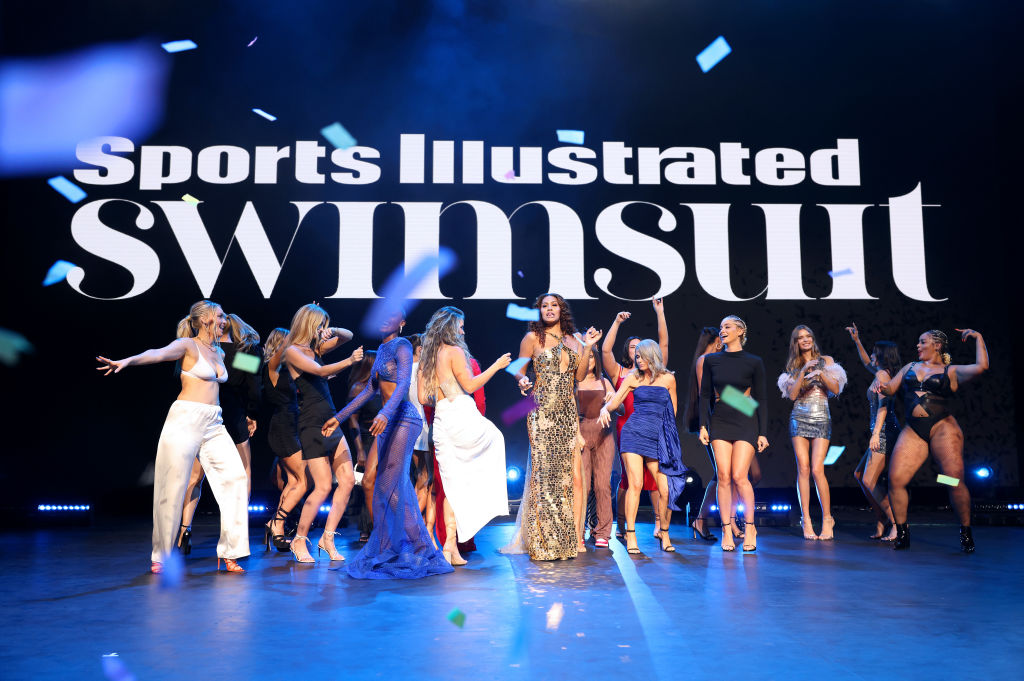Yes, “Parties of No” can win.
Bikini Dreaming

The Sports Illustrated Swimsuit Issue misses the point, and the mark.
Once upon a time, Sports Illustrated put a bewitching dream in your mailbox: impossibly leggy women who accumulated fat (or, ahem, silicone) solely in their bosoms, photographed in scanty bikinis on exotic beaches. It was too good to last.
In the year 2021, in keeping with the dominant cultural narrative, Sports Illustrated put together an inclusive Swimsuit Issue. Some white model-looking chicks were joined by some black model-looking chicks; several very fit, but clearly non-model types (we, women, can spot such things easily); a model who turned out to be whopping five weeks pregnant, a 57-year-old who doesn’t look her age, an Olympian, a token transsexual who looks not just passing, but passing for a model, and several women struggling with obesity. At least I hope they are struggling, instead of complacently accepting or celebrating it.
The magazine’s longtime editor MJ Day explained:
“For years we’ve been working tirelessly to move the needle and change the conversation around beauty and acceptance,” said Day. The “incredible women featured in the issue represent some of the most powerful voices of today.”
Too bad the images in question make the editor come across more like someone following the trend than a revolutionary innovator taking chances. Truly grotesque models have already been featured in multiple fashion spreads. If anything, Sports Illustrated is a moderating force, promoting a watered-down version of what a few years ago would have been considered an alternative beauty. Ambiguous sexual orientation, and obviously unhealthy weight are already a regular fare of corporate fashion publications. The conventionally pretty girls in the Swimsuit Issue merely make it easier to swallow. It’s almost quaint that Sports Illustrated thinks it’s moving needles.
The word “acceptance” irks me the most in this context because acceptance is the antithesis of beauty. One does not “accept” beauty, one is awed by it. Dostoyevsky wrote a bit about the subject in The Brothers Karamazov, “The awful thing is that beauty is mysterious as well as terrible. God and the devil are fighting there and the battlefield is the heart of man.” Alternatively, the title character of The Idiot promised redemption: “Beauty will save the world.”
Beauty uplifts, it allows us to experience something extraordinary, and otherworldly, but, regardless of its potential to save the world, it remains morally ambiguous. No wonder the woke left is having a hard time with it. Feminists are particularly guilty of philistinism. As the cultural commentator and self-described “dissident feminist” Camille Paglia never fails to mention, the women’s movement is stuck on sociology, and is hostile to art.
The woke tend to have a conspiratorial mindset. Supermodel bodies are a Madison Avenue plot to sell beauty products with the consequence of infecting women with eating disorders. Never mind that eating disorders like anorexia are exceedingly rare, have ancient origins, and the mainstream of psychological science doesn’t believe them to be caused by advertising. The idea that capitalism makes women sick has been the dominant feminist narrative for decades.
The slender body that our society sees as the feminine ideal is not a conspiracy concocted by greedy executives, but a social convention that emerged over the course of centuries. Ancient farmers living on the verge of starvation worshipped maternal goddess figurines because prehistoric ideals of beauty were dictated by the need to make additional farm hands. By contrast, in an urban society, where anyone can breakfast on Pop Tarts, and dine on Velveeta, children are a cost center. At the same time, a slender woman represents prudence, and self-restraint, qualities valued by the middle class.
The woke are intent on eliminating what appeals to the bourgeois eye, and promoting the body type common among lower income women. If they hate America, and modernity, it makes sense that they would resent its aesthetic, and, by extension, its moral principles, embracing the look of those who, in their opinion, failed at capitalism and were failed by it.
The beauty equity agenda adopted by corporate magazines and retailers is cowardly, and dubious. It is possible to uphold more than one paragon of perfection, but to have a beauty ideal at all one has to declare that something else is not beautiful. No matter how our society defines it, not every woman will possess that terrible power.
Instead of celebrating beauty by showing us someone they consider exceptionally good looking, as they have been doing for decades, Sports Illustrated grabbed a whole bunch of variously endowed women. To avoid being scolded by the woke establishment they gave up on knowing what they like. Whatever claim it had for being a publication for discerning men is lost. Instead, SI transformed itself into a self-esteem sheet for neurotic women: no man cares how an athletic woman looks in her first month of pregnancy or if an elderly woman can pass for 40. The Swimsuit Issue is another mirror for female vanity.
It’s an established fact that not all men prefer the body types we see on the catwalk, and the ones who are attracted to large women are not hard to find. If some of us end up feeding cats at the end of our lives it’s not because we are denied love by advertising agencies that promote women with exceptionally high cheekbones.
Women might want to look like cover girls, but it’s not a condition for a normal, fulfilling life. It’s a measure of maturity — and feminism was supposed to be about maturity — to accept that most of us are not going to be that face, no matter who sets the standards.
The American Mind presents a range of perspectives. Views are writers’ own and do not necessarily represent those of The Claremont Institute.
The American Mind is a publication of the Claremont Institute, a non-profit 501(c)(3) organization, dedicated to restoring the principles of the American Founding to their rightful, preeminent authority in our national life. Interested in supporting our work? Gifts to the Claremont Institute are tax-deductible.
Any authentic women’s movement must acknowledge the realities of womanhood.
Is modern social change a reflection of women’s new power?



